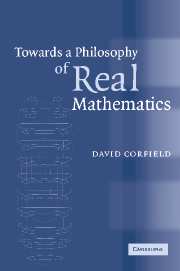Book contents
- Frontmatter
- Contents
- Preface
- 1 Introduction: a role for history
- PART I HUMAN AND ARTIFICIAL MATHEMATICIANS
- PART II PLAUSIBILITY, UNCERTAINTY AND PROBABILITY
- PART III THE GROWTH OF MATHEMATICS
- 7 Lakatos's philosophy of mathematics
- 8 Beyond the methodology of mathematical research programmes
- 9 The importance of mathematical conceptualisation
- PART IV THE INTERPRETATION OF MATHEMATICS
- Appendix
- Bibliography
- Index
8 - Beyond the methodology of mathematical research programmes
Published online by Cambridge University Press: 22 September 2009
- Frontmatter
- Contents
- Preface
- 1 Introduction: a role for history
- PART I HUMAN AND ARTIFICIAL MATHEMATICIANS
- PART II PLAUSIBILITY, UNCERTAINTY AND PROBABILITY
- PART III THE GROWTH OF MATHEMATICS
- 7 Lakatos's philosophy of mathematics
- 8 Beyond the methodology of mathematical research programmes
- 9 The importance of mathematical conceptualisation
- PART IV THE INTERPRETATION OF MATHEMATICS
- Appendix
- Bibliography
- Index
Summary
INTRODUCTION
It is well known that, prior to his untimely death, Lakatos had hoped to return to the philosophy of mathematics bringing with him there some of the constructions he had formulated during his study of the development of the natural sciences. The problem which had faced him in the philosophy of science was to rectify Popper's depiction of scientific methodology taking account of Kuhn's criticisms, yet avoiding what he saw as the relativist pitfalls of the Kuhnian approach. He inherited from Popper an appreciation of the heuristic role of metaphysics in scientific theorising, which had marked Popper's difference from the Logical Positivists, and indeed placed a greater emphasis on this role by allowing room for it within the structure of a research programme.
We may observe, then, that as he switched from mathematics to science, the targets of his philosophical criticism changed from logicism and formalism to positivism and Kuhnian relativism. This should lead us to wonder which threats he would have been warding off with a methodology of mathematical research programmes. Two possibilities suggest themselves. First, he might have wanted to use this methodology to intensify his attack on logicism and formalism begun in Proofs and Refutations and continued in other works. Second, seeing that in the 1970s there was no apparent relativist threat as regards mathematical knowledge, he might also have wanted to create a prophylactic against the future appearance of such a threat.
- Type
- Chapter
- Information
- Towards a Philosophy of Real Mathematics , pp. 175 - 203Publisher: Cambridge University PressPrint publication year: 2003



